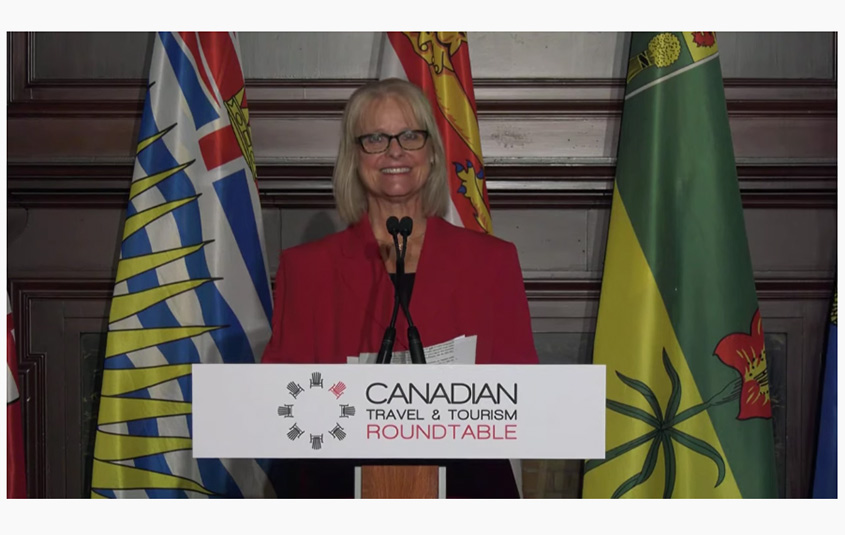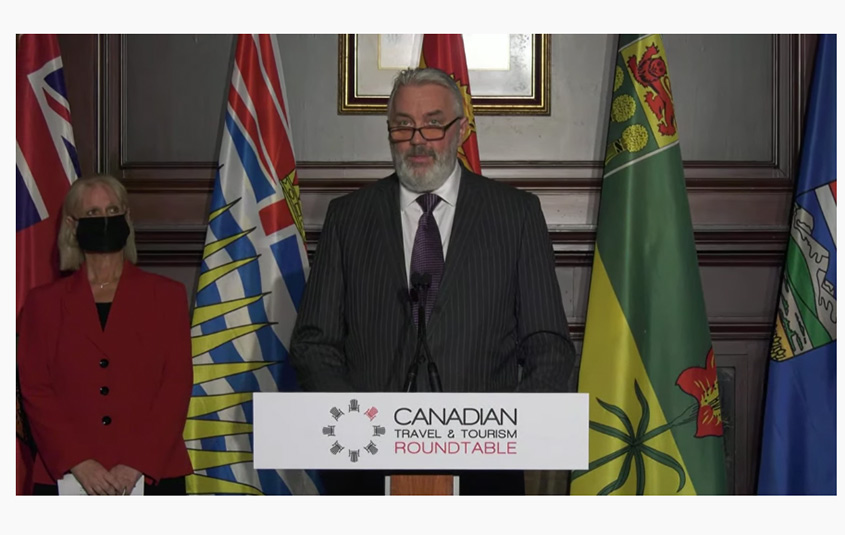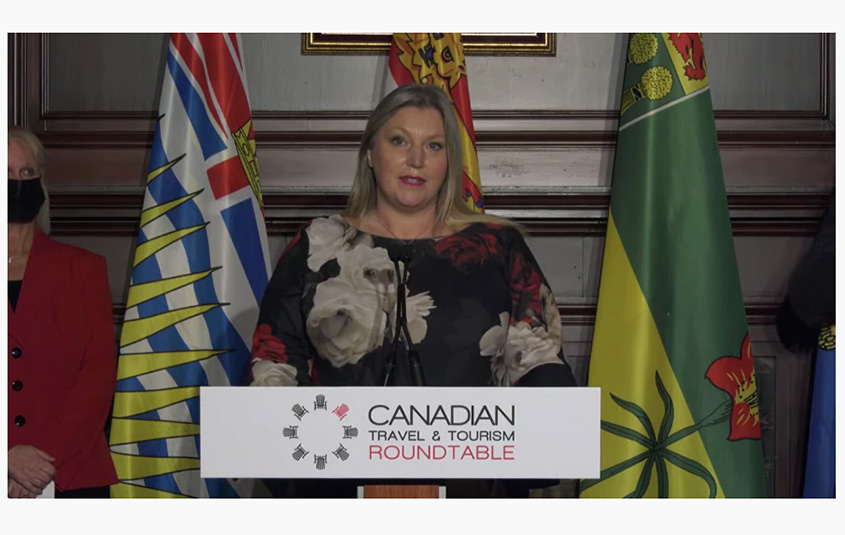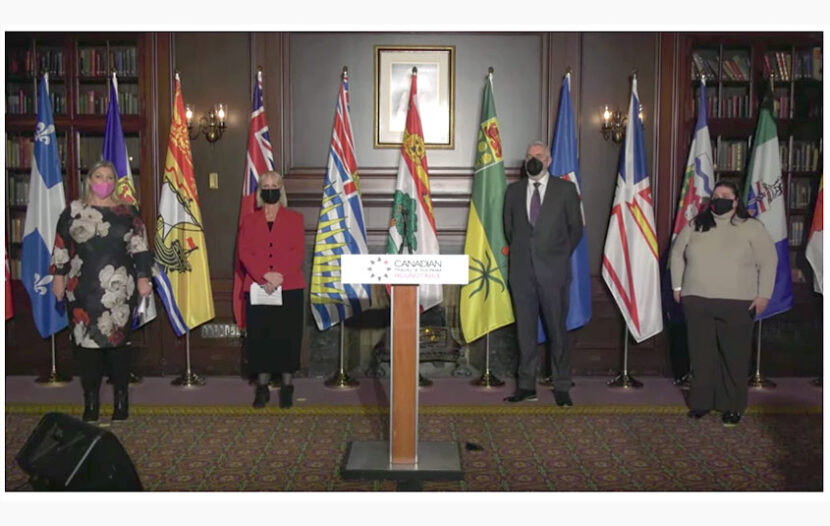TORONTO — Remove Canada’s pre-departure testing requirement and remove it now, was the clear takeaway message from yesterday’s press conference hosted by members of the Canadian Travel & Tourism Roundtable.
Held at Toronto’s Fairmont Royal York, the media briefing featured representatives from ACTA, the Canadian Snowbird Association and CanAge, a national seniors advocacy organization, all of whom highlighted the significant impact that the testing requirement continues to have on the Canadian travel industry and Canadian travellers, particularly seniors.
Currently, all travellers five years of age or older, regardless of citizenship or vaccination status, must show proof of a COVID-19 negative molecular test result taken within 72 hours of their departure to enter Canada, or proof of a previous positive test result taken between 14 and 180 days. Rapid antigen tests are not accepted.

Wendy Paradis
“Seniors are ready to escape the Canadian winter for a time and families are planning their next vacation,” said Wendy Paradis, ACTA President. “Unfortunately, the closer travellers get to their departure or paying their final payment for their trip, they are often cancelling or rescheduling. The reason? Confusion about the border overall ever-evolving rules, testing and an overall feeling of uncertainty are keeping people at home. These feelings of uncertainty and confusion are very common amongst our senior clients.”
Paradis noted that even with the recent lifting of Canada’s non-essential travel advisory, Canadian travellers who are fully vaccinated are still faced with the costly expense of a pre-departure PCR test, which can run around $200 per person.
“This government policy was intended to be temporary and is counter to the recommendations by the federal government’s COVID-19 testing and screening expert advisory panel report, which was reported in May of this year,” she said. Paradis also noted that many countries including France, Germany, Portugal and the United Kingdom have already removed their own pre-departure and arrival testing policies for fully vaccinated travellers.
“Many Canadian seniors want to start heading south for milder weather, and many of their children and grandchildren go and visit them at the holidays or during March Break. Unfortunately, this year many families will not be able to do this, not because of COVID-19 but rather because of the high cost of burdensome government policy, which is not based on science or evidence,” said Paradis. “We’re asking the federal government to follow the advice of their own expert panel of doctors and scientists, and to look at what is happening around the world, particularly the G7 and G20 countries.”

Michael MacKenzie
“Travel is becoming cost prohibitive for our members”
Michael MacKenzie, executive director of the 115,000-member Canadian Snowbird Association, emphasized how government policy should reflect the huge strides Canada has made this past year in terms of vaccination, health and safety.
“At present we have some of the highest vaccination rates in the world, with more than 83% of the country’s population fully vaccinated, and as a result case numbers have declined significantly,” he said. “But the government continues to force unnecessary burdens on travellers that are not based on science. With the continued requirement for a pre-departure PCR test, travel is becoming cost prohibitive for our members, many of whom are retirees on fixed or limited incomes.”
According to MacKenzie, approximately one million Canadian snowbirds make the annual trek south of the border every winter, with about 600,000 spending a full six months. However, during the pandemic, the association saw a 70% reduction in travel among its members, most of who drive across the U.S. border.
But the good news is, feedback from its members indicate that the vast majority are planning to travel again this year. And in addition, with the United States now expanding eligibility for COVID-19 booster shots to those 65 years of age and over, returning Canadian snowbirds will be “the safest and most vaccinated Canadians when they return home in the spring,” said MacKenzie.

Lorraine Simpson
“I personally am seeing cancellation after cancellation”
To provide an agent’s perspective, yesterday’s panel also heard from Lorraine Simpson, founder of Laorraine Simpson Travels and a widowed mother of four who started her career as a travel agent 20 years ago in an unfinished basement.
Noting how many seniors are simply choosing to stay home due to costly testing and unclear messaging, Simpson said the tourism industry is bracing for more cancellations.
“I personally am seeing cancellation after cancellation,” she said. “As you can imagine, over the past 18 months, it has been catastrophic for the travel and tourism industry and for myself as a small business owner.”
What senior travellers want, added Simpson, is certainty, which is why many trust the value of a trusted travel agent.
“Seniors are looking for certainty and cost certainty and the travel industry is back in a position where we can provide certainty to our customers,” she said. “However, outdated federal government policies are making this difficult. The pandemic vaccination status and available science have changed and so, too, should the response and measures to keep Canadians safe while allowing the travel and tourism industry to reopen. We ask the federal government to remove unnecessary barriers and expense.”

